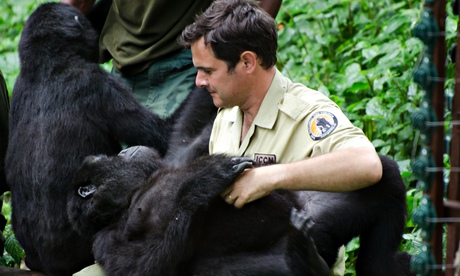
I trained as an anthropologist even though from an early age I was interested in animals. It’s counter-intuitive, but I grew up at a time of a great poaching crisis in Kenya when the country lost half of its elephants. All the fundamental problems involved human behaviour. So I realised it was more valuable to study humans. The wildlife can look after itself – humans have to be managed.
Our family holds title as Princes of Belgium, but I am not a member of the royal family – we’re not Saxe-Coburgs. I was born in Carthage and my parents moved to Kenya when I was three months old. My wife is Kenyan, my children are Kenyan, but I feel Belgian. It’s a stew.
Purists say you shouldn’t compare great apes to humans, but when you are among them, you can’t help it. Gorillas take on all the positive aspects of being human: the affection, family values, their stability in groups.
We don’t have the exact numbers of rangers who have been killed [by militias and other armed groups]. In the mid-90s they were getting killed and it was not documented. We do know 140 have been killed since the war in 1996. This is the park that has paid the greatest price for its protection.
I have spent 20 years thinking about bravery, about why the rangers keep working under such conditions. For some it is because there aren’t that many options, because it is a good job. For others it is because their parents and grandparents were rangers. For others still it is the unfashionable concept of loyalty – it is their duty to protect the park.
I had no profound moment when I was shot [by still-unidentified assailants] – I was living second to second – but I was profoundly moved by the people who stopped to help me. Two very poor Congolese farmers on a motorbike threw the large sacks of vegetables they were taking to market on to the ground, picked me up and got me out of that place. People drove past who didn’t stop, but these two didn’t panic.
I met my wife [palaeontologist Louise Leakey] a long time ago. She is my main source of advice. She was practically born in the field and has spent many years in conservation in northern Kenya.
Although there are immediate problems about survival in a war, you also have to think about the future. You cannot allow the future to be destroyed. The mountain gorillas represent enormous potential for the development of communities. Rwanda, which had many of the same problems, earns $430m from tourism. It takes decades for wildlife populations to recover, but they can be destroyed in days. You have to protect wildlife even if there is a war going on. Protecting wildlife is not a luxury.
I lose my temper all the time, but I try to manage it so nobody notices. You do irreparable damage to the people facing you when you raise your voice. It’s a sign of disrespect.
I am not anti-mining and oil. We all benefit. But Soco [a British petroleum company which has been prospecting in Virunga] has put itself in a difficult situation. It’s undertaking activities in an area where there is serious armed conflict that’s now recognised as having at its root the exploitation of natural resources.
I have everything I could possibly want around me. The only thing missing is my family. Apart from that I could live here for ever.
Virunga previews at Picturehouse cinemas from 6 October and on Netflix after that (virungamovie.com). For details on the national park, go to virunga.org

